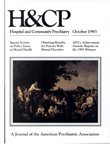The Least Restrictive Alternative in the Postinstitutional Era
Abstract
The legal concept of the right of psychiatric patients to treatment in the least restrictive alternative has come to mean treatment anywhere but in the state hospital, as illustrated in two large communities in Ohio and Massachusetts. Oversimplified application has led to the use of treatment setting as the only measure of restrictiveness. Patients' characteristics and needs have been ignored, along with the possibility of wide variation in program quality within each class of facility. The role of the state hospital has become uncertain, making it difficult to attract and keep qualified professional staff The authors argue for an expanded view of the concept that includes consideration of patients' needs. They contend that the concept should not be used as a sole reason to avoid admitting patients to state hospitals or to continue the downsizing of public institutions.
Access content
To read the fulltext, please use one of the options below to sign in or purchase access.- Personal login
- Institutional Login
- Sign in via OpenAthens
- Register for access
-
Please login/register if you wish to pair your device and check access availability.
Not a subscriber?
PsychiatryOnline subscription options offer access to the DSM-5 library, books, journals, CME, and patient resources. This all-in-one virtual library provides psychiatrists and mental health professionals with key resources for diagnosis, treatment, research, and professional development.
Need more help? PsychiatryOnline Customer Service may be reached by emailing [email protected] or by calling 800-368-5777 (in the U.S.) or 703-907-7322 (outside the U.S.).



